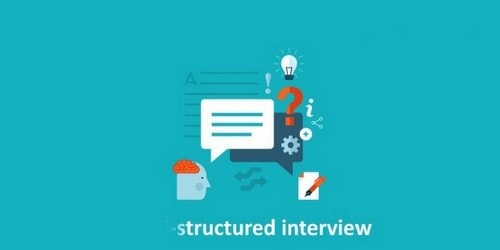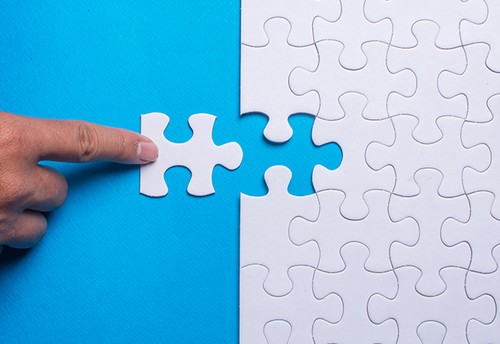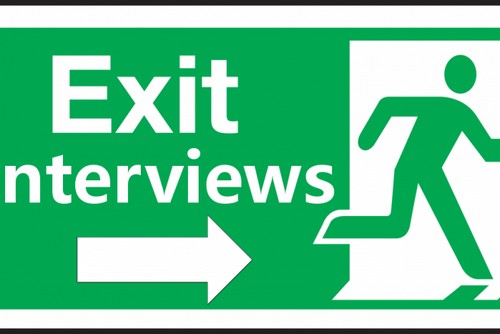An interview is a process adopted by an organization to know about the prospective candidate by asking him/her questions and getting answers. An interviewer is an expert representing organization poses questions to the interviewee in order to elicit information.
An interview is considered the most effective way to assess potential employees. Every organization has a different hiring process. They have their preferred way to get the information to make a hiring decision.
Some organizations have a hiring process which includes only two interviews whereas others have more than two interviews in their hiring process. Sometimes the type and number of interviews also depend on the nature of the job offered. For example, most IT organizations conduct two interviews such as technical interview and HR interview.
A candidate is asked questions related to his/her technical knowledge in technical interview whereas in HR interview personal questions related to interests, hobbies are asked. It is important for a candidate to know the style and nature of each type of interview to succeed in it. Here is an overview of different type of interviews.
Table of Contents
1) Structured :
A structured interview is the most common type of interview. It is typically a formal and organized interview and includes one or many interviewers. Usually, structured interviews begin with introduction questions.
Such questions are asked to make the candidate comfortable and relaxed before asking difficult and serious questions. A discussion about the weather or running cricket match series may be used to start the interview. After the candidate is comfortable, he/ she is asked questions about the past education or past work experience or co-curricular activities they took part in.
The difficulty level increases with each question. Further, interviewees talk about the company and its position for a few minutes. The interviewer may describe day-to-day responsibilities, working culture and the company’s philosophy. In the last, the interviewer may ask the candidate to ask questions if they have any.
For such scenarios, the candidate should prepare a few questions such as, what are the opportunities facing the company at present? Or what do you like most working with the company? If a candidate asks questions about the organization it shows that he/she takes interest in it and look forward to work for it.
2) Unstructured interview :
Unstructured interviews don’t come with a well-prepared list of questions. In such interviews, the interviewer is more interest in listening to you. Therefore, you are asked several open-ended questions. Unstructured interviews are discussion-based interviews and don’t have a formal manner. The interviewer asks questions about hobbies, interests, weekend activities, adventurous sports etc. This type of interview is preferred by college students because they usually don’t like formal interviews.
However, some employers adopt this interview type purposefully to make candidates reveal things about themselves which they usually would not reveal. Therefore, candidates should stay cautious about what to say and what to not and don’t leave professionalism at any point of the interview. By maintaining the professional yet relaxed tone, you can convince the employer that you are the most deserving candidate for the job. Mostly, candidates make the mistake of letting their guards down in the flow.
On the contrary, one should keep a casual and positive tone and talk more about the qualities, skills, and qualifications. Lastly, unstructured interviews are easier than structured interviews, but it is tricky to succeed in such interviews.
3) Stress :
Stress interviews are conducted by the employer for the posts where there is a high amount of stress most of the days. In such interviews, candidates are put in a difficult situation or asked tricky questions to check the level of stress they can endure. Similar questions that are asked in structured and unstructured interviews are asked in the stress interviews. However, the style of asking these questions is different. The interviewer usually looks preoccupied, contrary or unresponsive to the candidate.
There will be times when the candidate will find the interviewer rude. The whole point behind creating a stressful environment Is to judge the reaction of the candidate. candidates are asked questions like why were you fired from company XYZ? are you qualified enough for this position? How do you think you are doing in this interview? Tell me one thing you failed at in your last job?
Candidate should not get tense when asked such questions. On the contrary, they should answer each question calmly and logically. These type of interviews are common in military, police selection. In MNCs, a stress interview is part of the selection for hiring people for sales and customer care.
4) Behavioural :
The behavioural interview is part of the hiring process for many organizations. Employers conduct this interview to find out how a candidate will behave in certain situations. They don’t want to know what a candidate can do, but they are more interested in knowing how they have behaved in past.
To do so, the interviewer will ask you to give some examples of the work you have done by giving examples from past jobs, college or school. In this interview, the interviewer wants to about certain skills such as problem-solving, interpersonal skills, speaking and listening skills and critical thinking. An interviewer asks questions such as
- Give one example when you have worked under pressure?
- Describe a situation when you made a wrong decision and how did you handle it?
- How did you manage disagreements at work?
Candidates should not be frightened by this method. On the contrary, they should take it as an opportunity to portray their skills and achievements. Candidates should prepare in advance to face this type of interview. Refresh your memory and prepare stories when you did good at the job or you solved a problem or achieved something. No one can predict what kind of questions will be asked in the interview. Stay calm and refresh your memory to answer a question you haven’t prepared for.
5) Problem or case solving :
This type of interview is used to test the analytical, logical and communication skills of the candidate. In such an interview, you will be given a real problem and asked to present your course of action to solve that problem. Candidates should prepare for this type of interview by taking the help of experts. Candidates can be asked a question like what would you do if you don’t have enough information to solve a problem you face at work and you are required to take a quick decision?
While answering such questions, it is not necessary for you to give a correct answer, but the interviewer is more interested in your thinking process. A candidate should be able to find the root of the problem and use creative thinking to analyze the problem, list the possible steps and finally implement those steps to find the solution.
6) Panel :
In a panel interview, a number of interviewers take interview of a candidate. Sometimes the employer needs the opinion of several members of the organization before hiring a candidate. Therefore, a panel interview is an appropriate choice to accomplish this. These type of interviews are famous in public sector jobs. For example, IAS aspirants have to face a panel interview after passing the two most difficult written exams of the world. This panel interview is dreaded by all the IAS candidates.
A candidate should stay alert and focused during this type of interview. Memorize the names of interviewers and refer them with their last names affixed with suitable titles (Mr., Mrs., Ms./Miss). Direct your answer to the person who asked you the question, while doing this also make eye contact with other members of the panel. These type of interviews are mostly a mixture of a group interview and a behavioral interview.
Different types of questions such as personal, real-time problem based, IQ based and behavioral questions etc. are asked in panel interviews. A candidate should prepare well to face such interviews. You can ask your friends or elders to help you to face such interviews.
7) Group :
Three or more candidates are present in this type of interview. This type of interviews is not very common. Such interviews are conducted when multiple peoples are being hired for the same job profile such as sales job, military jobs etc. other than that, such interviews are also conducted in job fairs where there are thousands of candidates take part in the selection process. A candidate should act smart and active while facing such interviews. It takes gusto to come in the eye of manager among other potential candidates.
Don’t get nervous and speak at a normal tone which is audible to everyone. Compliment other candidates answers and build your own answers on it. Showcase your skills to work in a team and take a lead if required in group/ team tasks. Discuss all possible ways to finish the task and also, take the opinion of other team members and make an initiative to include them to finish the task.
The purpose of group interviews is to see how well a candidate can do in a team. Therefore, as mentioned before, do a lot of practice to become successful in such interviews.
8) Sequential :
When a series of interviews happen one after another is called a sequential interview. These type of interviews usually take place in one day or sometimes in several days. Therefore, these type of interviews are considered very tiring and difficult for most candidates. It is advisable to get the information from the person who calls you to schedule your interview.
You should ask about the job profile and responsibilities so that you can prepare accordingly. While preparing for such interviews prepare a set of questions for each type of interviews and get your answers ready. This will help you to be less nervous during the whole interview process.
Give consistent answers if you are asked the same questions in different interviews. because most of the times interviewers compare the notes so that they can find any discrepancy. Ask each interviewer about your next interview and prepare and revise your notes if you get time before the interview. After the interview, ask for the business card of each interviewer and send a thank you to each of them. This will help you to stand different amongst other candidates.
9) Lunch/dinner :
This type of interview is considered the most awkward interview by most candidates. In such interviews, they have to deal with the stress of a job interview while being in a casual environment. The purpose of taking such interviews is that the hiring manager wants to know about your personality and want to see how you will behave in casual environments. Make sure to know the place (if possible, table number too), time of interview before going on such interviews. otherwise, it will be very difficult to find the interviewer in a restaurant full of people and this may lead to an awkward start of the interview.
Use your best manners such as putting a napkin on the lap, using right fork and spoons, don’t talk with food in your mouth, don’t make eating noises and most importantly don’t reach others plates. In addition to all this, order your food wisely. Don’t order anything (for spaghetti) which is difficult to eat and make you look a mess in front of others. Take money and money cards with you and be courteous and offer to pay the bill for lunch/dinner.
If your interviewer insists on paying the bill for you so there are chances that interview was a success and he is thinking about hiring you.
10) Portfolio-based :
A portfolio is a file of the samples of your work. If you are a writer or researcher, it can include your articles or paper published. If you are a photographer or graphic designer, you can include photos clicked by you or designs made by you. This is a creative way of showing your skills and past work. Anyone can make a portfolio. You need to think about the skills you want to showcase in your portfolio.
You can explain the things you have included in your portfolio. In this way, you can take charge of the interview in your hands. A portfolio is beneficial for a candidate because it makes you look professional and help you stand out amongst the other candidates. Questions asked in this type of interviews are mostly technical and based on the work you have included in the portfolio.
Therefore, you should prepare well and in-depth about everything which is part of your portfolio. Candidates can practice for such interviews by talking about their portfolios in front of their friends and family. Lastly, be confident and give answers to each and every question enthusiastically.
11) Second :
A second interview happens when a candidate has passed the first interview and has been called for the second interview. Second interviews are more confusing because candidates do not know what to prepare.
To have success at second interview candidates should revise his/her answers that they have given in the first interview because there are chances that you will be asked the same questions again. In addition to this, prepare well about the company’s history, services, and product. Don’t miss to go through the “About Us” section of the company’s official website, also, search and read about the latest news related to the company.
Enquire about who is going to take an interview from the person you receive a call. Most of the times, second interviews conducted by companies are lunch/dinner interviews, so prepare yourself accordingly. Revise and prepare for the things that you missed in the first interview.
12) Traditional :
This type of interviews is also called hybrid interviews because these interviews are an amalgamation of several other interviews such as behavioral, stress and sometimes technical interview. In such interviews, questions like
- Tell me about yourself.
- Tell me about your strengths and weaknesses.
- what do your colleagues think about you?
- Where do you see yourself in the next 5 years?
To prepare for such interviews, candidates should prepare about themselves, qualification, skills, achievements, and future goals etc. These type of interviews last longer than other interviews.
13) Digital interview :
In the globalized and digital world, employers hire people from across the world. It is not possible every time to conduct an interview in-person. Therefore, in such scenarios, interviews are conducted on digital platforms such as Skype and Google Duo. A candidate can give this type of interview at the comfort of the home. That does not mean, you can give an interview in your pajamas. You should dress formally for digital interviews also.
There are a few things a candidate must do before the beginning of the interview to have a peaceful and uninterrupted interview.
- Your internet connection.
- Battery status of your device.
- wear formal clothes.
- Inform your family about the interview so that they will not disturb you in the middle of the interview.
- Sit on a chair with your legs hanging down and place your laptop or device on a table or flat platform so that you are clearly visible to the interviewer.
- Be ready to take the video call at least 15 minutes before the decided time.
- Lastly, put your other devices such as a mobile phone on silent so they will not distract you in the middle of the interview.
14) Puzzle interview :
This type of interview is conducted for the jobs of analytics or product-based companies. Companies like Google and Facebook are famous for conducting puzzle interviews.
Here is one example of a puzzle asked in this type of interview
What angle do the hour hand and minute hand make when the time is 3:15 on the clock?
These types of questions are asked to determine how a candidate can think in difficult situations and progress in the face of challenge. The key to getting success in such interviews is to improve your logical and analytical thinking by practicing different puzzles available online.
15) Telephonic interview :
Telephonic interview is one of the initial interviews of a hiring process. The preparation process of this type of interview is not different from the other type of interviews. However, there is no need to dress up formally for a telephonic interview. Try to find a quiet place if you receive a call without any prior appointment.
In case you are traveling at the time you receive a call ask them politely to schedule your interview later. Keep your documents and resume near you in case you need to refer them.
16) Performance and situational interview :
This type of interviews is conducted to test how a candidate will handle work-related situations. These abilities are necessary but are otherwise difficult to test. For example, a teacher is asked to give a demonstration of how she will teach in a classroom. Because there are several qualities (such as effective communication skills, subject knowledge, patience etc.) a teacher should have to deal with a class full of students.
There are tests like sales performance, customer role play, presentation performance, and management exercises are conducted for other types of job profiles. Candidates will be informed in advance for this kinds of interviews.
17) Role change interview :
Role change interviews are conducted within an organization for promotion or other reasons. Candidates are asked to do the jobs of other employees to test their skills. Role change interviews are conducted to give you experience about the different job type. This type of interviewing explores the skills of a candidate. To get success at this kinds of interviews one can take the help of colleagues who have already worked for that profile.
18) Exit interview :
Exit interviews are conducted when an employee is leaving an organization. These kinds of interviews are conducted with the employees who have worked for a long time with the organization. Candidates can give feedback about the services and work style of the company. Don’t reply with a straight and harsh answer if you are asked about the reasons to leave your jobs. It will never do you any harm if you leave your job at good terms.
19) Face – to – face interview :
This type of interviews is used for the survey purpose. In this type of interviews, the interviewer communicates with the person and ask questions from the questionnaire he has already prepared. These kind of interviewing are beneficial to collect information such as factual, consumer evaluation and attitude preferences. There are other methods also, but the face- to – face interviews increase the chance of gathering accurate data and it also increases the response rate.
20) Career fair interview :
Such selection interviews are usually followed by other short of final interviews to test shortlist candidates and job seekers.
This type of interview is last only for 10- 15 minutes. In career, fair candidates have less time to make an impression on the interviewer. In career fair interviews general questions are asked to shortlist the candidates as the more you know about the style of the interview.
Thank you for reading our job type interview article!
Liked this post? Check out the complete series on Interviews









